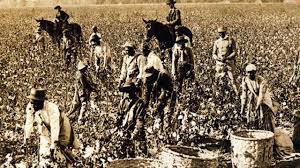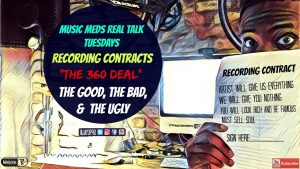The music business is an industry that eats its young. Many artists come into the industry with the hopes of gaining fame and fortune. Tv shows like American Idol and The X-Factor have created some bubble gum stars. Folks like Kelly Clarkson, Fantasia Barrino, Carrie Underwood, and Ruben Studdard have all went through the gumball machine. Many of these artists got a million-dollar deal but owned nothing. Their publishing was pretty much owned by the record labels. Once these guys won the competition they had to immediately get to work to recoup that million-dollar advance they were given. Artists, who signed major and independent deals, find themselves making less while working more.
The Music Business is based on the post-reconstruction slavery business model. When slaves were freed they had nowhere to live or work to make money. So, many of them found themselves going right back to slave owners, doing joint ventured business deals on the farm. The former slave owner of the farm was supposed to pay the freedmen a portion of the profits received, from the sale of the crops.
Many Slaves Couldn’t Read and Write
Many former slaves couldn’t read or write. So, the owner of the land would allow them to pick a pile of money for payment. For instance, one pile of money might be 50 pennies while the other pile might be 10 quarters. They were told to chose which one they wanted to be paid in. As you already know, the more coins you see, the more money you think you have. Many former slaves would choose the pile of pennies thinking they had more money. Year after year they worked the land, sun up until sundown, hoping to be paid a decent wage for their labor. But year after year, they were tricked and mislead by the landowner to keep them in debt, and working for pennies on the dollar. A lot of sharecroppers died broke and destitute.
Instead of receiving wages for working an owner’s land—and having to submit to supervision and harsh discipline—most freedmen preferred to rent land for a fixed payment rather than receive wages. – History
The Music Business Roots Are In Sharecropping
The Music Business derived its business model from sharecropping. Artists sign a contract only to get a small portion of their publishing and royalties. Artists create songs, perform, appear on the radio, and sell the product to the public. They are only paid a small percentage of their labor. In most instances, the artist ends up broke and destitute, leaving no wealth behind for loved ones.
only paid a small percentage of their labor. In most instances, the artist ends up broke and destitute, leaving no wealth behind for loved ones.
In the early 90’s artists like Master P, Jay Z, and Easy E started record companies to change the narrative. They wanted control over their masters and publishing. Def Jam owner Russell Simmons fought long and hard for his artist to get a bigger piece of the pie. In the meantime, major companies like Universal, Sony, Columbia, Artista, and EMI had to come up with a new business model to keep artists enslaved. So, they created the 360 deal to keep artists working long and hard, yet receiving minimal wealth.
The 360 Deal is Designed to Keep All the Money
Artists work their asses off, only to get a smaller portions of the monies being made. Fast forward to today, an artist like DMX, Black Rob, Shock G, and others were working as debt slaves to the corporations. They were never really making large sums of money without being taxed to death or indebted to a label. DMX owed nearly 10 million upon his death. Black Rob was robbed by Diddy. He owned most, if not, all of his publishing. The Music Business is a business that eats its young.
DMX, Black Rob, Shock G, and others were working as debt slaves to the corporations. They were never really making large sums of money without being taxed to death or indebted to a label. DMX owed nearly 10 million upon his death. Black Rob was robbed by Diddy. He owned most, if not, all of his publishing. The Music Business is a business that eats its young.
An artist who signs these deals don’t usually have money for good attorneys. They are eager to sign their life away, with the hope, they will make millions of dollars and be famous. Artists like Chuck D have gone on record about the slick ass tactics that record companies use to beat artists out of money.
In the Book R&B (Rhythm and Blues) The Political Economy of Black Music’, Chuck D gives several accounts of black artists struggling to survive in the business. Industry veteran Moses Avalon, also produced three books, to help artists from getting rapped in the business, as well. The Confessions of a Record Producer, Million Dollar Mistakes, and Secrets of Negotiating a Record Contract. Moses put it all in a book. Artists in 2021 have to read so they can beat the corporations at their own game. The more you learn the more you earn.
Related Books:
- Everything You Better Know about the Record Industry – Kashif
- Plain Simple Guide To Music Publishing – Randall D. Wixen
- Bands, Brands and Billions – Lou Pearlman
- Rhythm and Blues: The Political Economy of Black Music – Norman Kelly
- Life and Def Sex Drugs Money and God – Russell Simmons
Conclusion
The Music Business is designed for you, the artist, to work your fingers to the bone and die broke. Artists have no clue that the business model of the Music Business is based on the sharecropping business model. When the digital economy kicked in, companies like Apple, Amazon, and Spotify change how artists would get paid. As a result, the record companies had to come up with a new pay structure.
Artists are getting paid less for streams, digital downloads, and publishing. They own you. The music industry’s business model is alive and well. If you are an artist trying to break into the business, be rest assured that record company pimping is in full effect. You have to deal with the business from a standpoint of ownership, or you may never thrive, in this business called music.
Related Artist:
Prince Warns Young Artist: Record Contracts Are Slavery
Kanyne West Says The Music Industry is a Slave Ship



